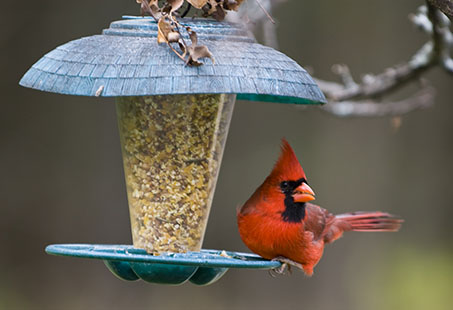Something to Tweet About
Jan 10, 2022

Cooler temperatures bring the opportunity to be visited by dozens of different backyard bird species including finches, sparrows, woodpeckers, and cardinals. While their characteristics and specific needs may vary, all come to your yard with the same intention: to eat!
As more and more birds are attracted to your feeder, you may find yourself purchasing larger quantities of birdseed. In some cases, you may even choose to buy in bulk to save money while feeding your flock.
Here are five tips for storing birdseed at home:
Buy fresh birdseed
Many people instinctively trust the retailers that they buy their seed from. However, the longer the bag sits on the shelf, the more likely it is to accumulate mold or insects. Avoid buying seed that is visibly spoiled, musty-smelling, or clumped. Because of their commitment to livestock and wildlife, your local Co-op diligently checks each bag of feed that is stocked to ensure it is fresh and healthy for consumption.
Store seed in a cool, dry place
Seed that is kept in a cool, dry place out of the elements will last longer and stay fresher. A garage, shed, patio storage box, or aluminum garbage can are common places to store seed. Avoid storing your seed outside unless you live in a consistently cool climate.
Use proper containers
Choose containers that will not crack or break over time. Sturdy plastic bins or galvanized metal cans are some of the most popular choices. Seal the containers tightly with a lid to prevent access of rodents, insects, or water.
Change the seed in the feeder
The seed that is stored in your bird feeder is just as important as the feed that is stored in your shed. If your bird feeder has been full for some time, it is a good indication that your seed is no longer fresh. Birds will not eat seed that is moldy, rancid, or insect-infested. Make sure the seed in your feeder stays as fresh as possible by routinely emptying whatever is not eaten.
Buy birdseed with shells
Seed that is protected by shells will last for a very long time if properly stored. Black oil sunflower seeds are one of the most popular types of seed and are loved by birds of all species. Other types of seed will need to be bought in smaller quantities so that none goes to waste.
It is essential to have a plan in place for storing your seed so that you can preserve the nutritional content of the seed and prevent spoilage. Seed that is not properly stored may begin to mold and mildew, and if eaten, could pose potentially fatal consequences to your birds. For all of your wild bird needs, including feeders, seed, birdhouses, and storage containers, visit your local Co-op.
For more content like this, check out the latest issue of the Cooperator.
As more and more birds are attracted to your feeder, you may find yourself purchasing larger quantities of birdseed. In some cases, you may even choose to buy in bulk to save money while feeding your flock.
Here are five tips for storing birdseed at home:
Buy fresh birdseed
Many people instinctively trust the retailers that they buy their seed from. However, the longer the bag sits on the shelf, the more likely it is to accumulate mold or insects. Avoid buying seed that is visibly spoiled, musty-smelling, or clumped. Because of their commitment to livestock and wildlife, your local Co-op diligently checks each bag of feed that is stocked to ensure it is fresh and healthy for consumption.
Store seed in a cool, dry place
Seed that is kept in a cool, dry place out of the elements will last longer and stay fresher. A garage, shed, patio storage box, or aluminum garbage can are common places to store seed. Avoid storing your seed outside unless you live in a consistently cool climate.
Use proper containers
Choose containers that will not crack or break over time. Sturdy plastic bins or galvanized metal cans are some of the most popular choices. Seal the containers tightly with a lid to prevent access of rodents, insects, or water.
Change the seed in the feeder
The seed that is stored in your bird feeder is just as important as the feed that is stored in your shed. If your bird feeder has been full for some time, it is a good indication that your seed is no longer fresh. Birds will not eat seed that is moldy, rancid, or insect-infested. Make sure the seed in your feeder stays as fresh as possible by routinely emptying whatever is not eaten.
Buy birdseed with shells
Seed that is protected by shells will last for a very long time if properly stored. Black oil sunflower seeds are one of the most popular types of seed and are loved by birds of all species. Other types of seed will need to be bought in smaller quantities so that none goes to waste.
It is essential to have a plan in place for storing your seed so that you can preserve the nutritional content of the seed and prevent spoilage. Seed that is not properly stored may begin to mold and mildew, and if eaten, could pose potentially fatal consequences to your birds. For all of your wild bird needs, including feeders, seed, birdhouses, and storage containers, visit your local Co-op.
For more content like this, check out the latest issue of the Cooperator.